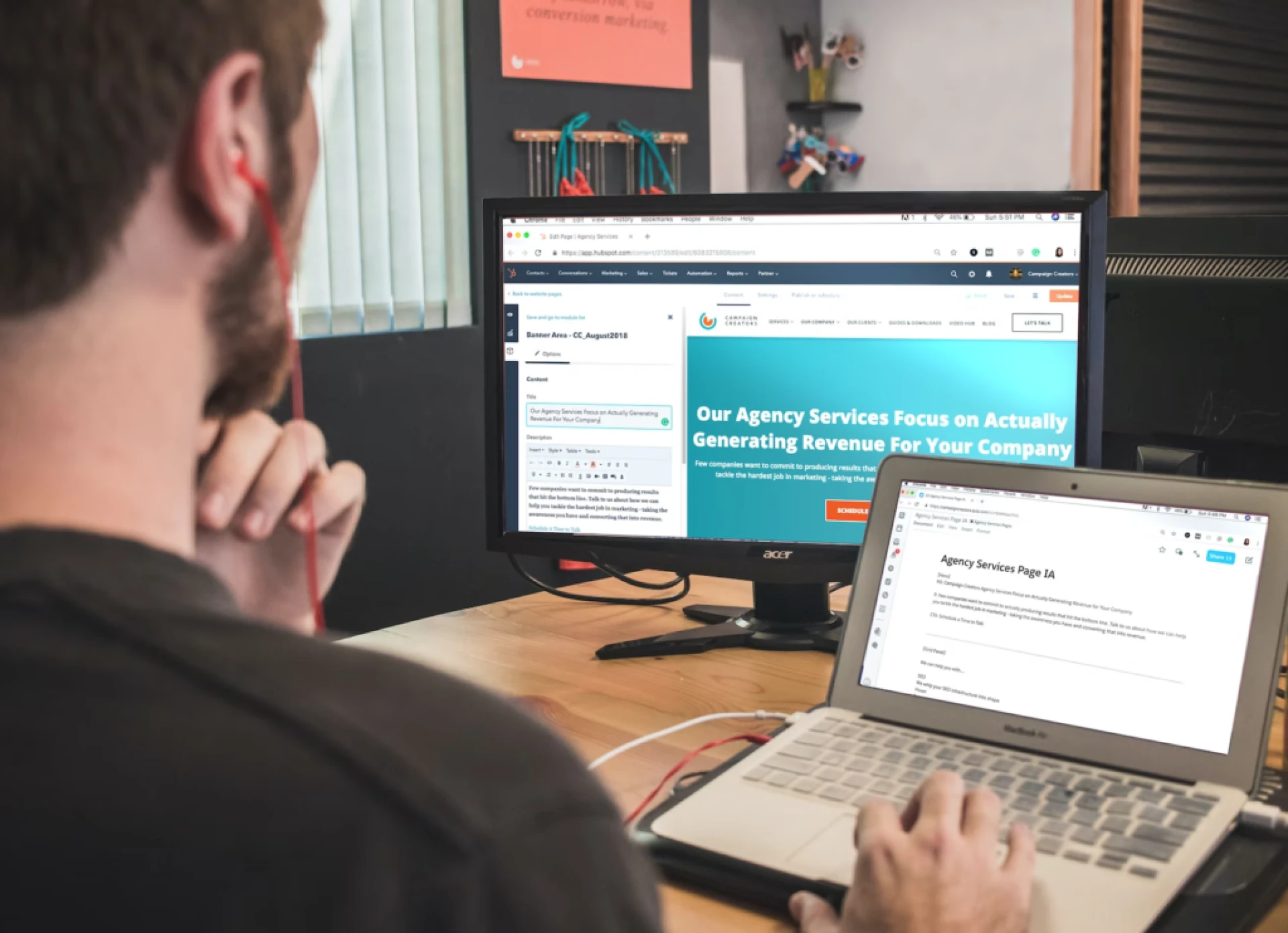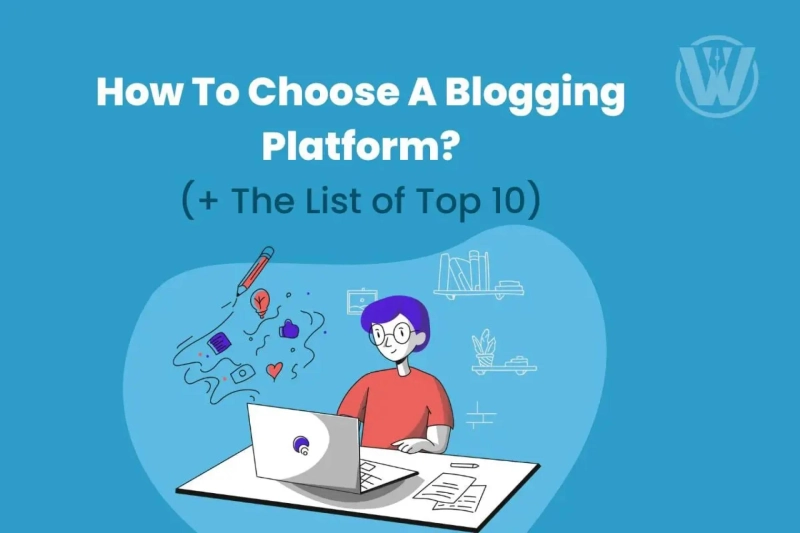There are thousands of blogging platforms out there. Which one should you choose? How do you know which ones are worth investing time into?
The key to choosing the right platform is understanding what you want from it. There are three main types of blogging platforms: free, subscription, and self-hosted. Each has its pros and cons, so it pays to know what you’re looking for before you invest time or money.
In this blogging guide, we have included everything you should know before choosing a blogging platform for your journey. All these tips are compiled after thorough research—so you don\'t have to waste your time lurking around the Internet.
Blogging Platforms: Things To Take Into Account

Here are some crucial points that help you in choosing your best blogging platform:
Simple to use
You must choose a blogging platform that is simple to use for you. The need for technical expertise or coding skills shouldn\'t hinder.
Customizable
Select a blogging platform that allows flexibility in customization. Therefore, you’ll be able to design your web pages as per your needs or brand aesthetics.
A lot of blogging platforms include user-specific themes that might be useful in a variety of ways. For instance, WordPress, a blogging platform, in contrast to Blogger, offers more customization options.
Budget-friendly
While some blogging platforms are free to use and offer some services, you may still use commercial blogging platforms for a better user experience.
With various-different plans, several blogging platforms and hosting websites provide their consumers with a wide variety of new services.
Skill level
Select your blogging platform based on your degree of expertise. As a beginner, you should choose a less technical blogging platform.
Further, if you have coding experience, you may check out more technical blogging platforms such as WordPress.org.
Traffic-friendly
If your goal is to attract massive amounts of traffic, then it’s best to consider a blogging platform that can handle it.
There are several blogging platforms that can handle huge traffic if you pay them. But if you want a free solution, we recommend you go with Medium or WordPress.com
Further, if you can manage the tech-aspect of blogging, you can also buy a web hosting and set up your own blog on WordPress.org.

Easily Navigable
Blogging platforms should have a clean UI and easy navigability. If you get stuck in features and complex options, you’ll end up frustrated.
Simplicity is the ultimate sophistication and therefore, you must choose a blogging platform which you can understand easily. We recommend starting with Blogger.com, Medium, or WordPress.com if you’re an absolute beginner.
How Do I Pick Blogging Platforms? (Errors to Avoid)
Too many choices can weaken the decision. Therefore, you must choose a blogging platform based on your preferences and not the amount of features a platform provides.
Here are some mistakes and errors that you should avoid making before choosing blogging platforms:
- Consider your specialty or niche carefully. You must have interest or knowledge of your topic.
- If you are a non-technical person, choose a platform that doesn\'t require any technical knowledge or little to no coding experience.
- Ensure the blogging platform you choose provides the option to scale or easy migration once you outgrow.
List of the Top 10 Blogging Platforms
1. Blogger
One of the first blogging platforms is Blogger. It is a Google blogging service widely used by millions of people worldwide. It is ideal for people who want to develop leisure blogs as a pastime or for extra money.
Pros
- Blogger is a no-cost blogging platform.
- You don\'t need major coding or technical skills to use.
- Google’s security and prevention from malicious infections.
Cons
- There are no plugins to expand functionality.
- Domain redirection takes time.
- Less customization of your theme.
- Bad domain and long URL structure.
2. WordPress
WordPress is a blogging platform that comes highly recommended. It has made a name for itself as the top blogging platform. Today many big brands host their website on WordPress.
Pros
- WordPress.org is free while WordPress.com has both free and paid versions.
- It includes certain free plugins that can enhance your site\'s existing capabilities.
- WordPress.org is an open-source platform.
- The platform has a mobile application, allowing you to use it on the go.
- WordPress powers more than 28% of the websites on the Internet.
Cons
- Expensive plugins.
- A speed reduction brought on by some generic code in some themes.
- The website can break if you touch code.
- More vulnerable to hackers.
3. Medium
Medium is a versatile platform that has a wide range of user base. It allows individuals with an account to publish “stories” and share it to the world.
Further, it’s one of the best blogging platforms as it can handle huge traffic without you needing to pay anything. However, Medium has very limited features and offers very little customization.
Pros
- It is simple to use and suitable for non-technical people.
- You can monetize your “stories” and earn handsome revenue.
- Medium makes technical SEO easy.
Cons
- Cut-throat competition as there are a lot of creators.
- Lack of control and customization.
4. Tumblr
Tumblr is one of the beginner-friendly blogging platforms out there. You can post on this free microblogging platform and make your content reach a wider audience.
Furthermore, brands typically use it as a platform to express themselves.
Pros
- This blogging platform is suitable for creative individuals and organizations.
- You can build a social community.
- It has a higher engagement rate and SEO benefits.
- The user interface is intuitive.
Cons
- No support for plugins.
- Only a few customization choices available.
- You have limited authority over your website.
- You can’t post more than 250 times in a day.
5. Ghost.org
Ghost is an easy-to-use platform with a simple and minimalist user interface. It is a free and open-source blogging platform.
Although the Ghost software is free to download, premium hosting is required to use it.
Pros
- Simple to use and similar to several of the top blogging platforms.
- It gives your site customization possibilities as well.
- Well-optimized for SEO.
- Beginner-friendly interface with advanced integrations.
- It can be 20x faster than other platforms because it doesn\'t rely on plugins.
Cons
- You might need a tiny knowledge of coding.
- You get only a few free themes.
- Ghost Pro is costly when compared to other similar blogging platforms.
6. LinkedIn
LinkedIn is the #1 social media of working professionals, business persons and the corporate world. Interestingly, LinkedIn also offers a platform to publish articles. Therefore, if your niche lies in the business domain, you can leverage LinkedIn and grow your following on this platform.
Pros
- Specifically designed for working professionals of the business and corporate world.
- Easy-to-use publishing platform.
- LinkedIn helps you expand your network and grow followers unlike other platforms.
- No technical expertise is needed to make an account or publish an article on LinkedIn.
Cons
- Fewer customization options.
- The analytics reporting is minimal.
- Tough competition.

7. Squarespace
Squarespace is one of the most robust and adaptable blogging platforms. You can produce visually appealing and shareable content using its designer templates.
Further, Squarespace is relatively easy to use and beginner-friendly.
Pros
- It has a plethora of tools, templates, and designs.
- The platform has a user-friendly backend layout.
- The customer support service is excellent, with 24/7 support through email tickets and live chat.
Cons
- Costlier than WordPress.
- You have little control over your website.
- There are no plugins available.
8. Wix
Wix is a cloud-based blogging platform that offers all the functionality required to build a beautiful website. However, there are some restrictions on the Wix blogs for users.
Pros
- Free to use but gates certain features behind a paid plan.
- No technical knowledge is needed.
- Wix App Market lets you add new apps to your website, extending its functionality.
- Simple drag-and-drop interface.
- A massive template library is also available.
Cons
- The site can’t be transferred if you plan to move on.
- The templates are not interchangeable.
- A subscription package is required for tracking and analytics.
- Not suitable for big businesses and enterprises.
9. Weebly
One of the simplest blogging platforms is Weebly, used mostly by small enterprises. It is a feature-rich content management system for developing blogs but limited features.
Pros
- Beginner-friendly.
- Weebly has integrated SEO tools.
- Reliable blogging platform for e-com businesses.
- Templates are available for customizability. Further, the library gets regularly updated.
Cons
- There could have been more features for bloggers.
- Its backup system could be more effective.
10. Typepad
Typepad is another blogging platform that you can trust and rely on. The platform provides customizability, lets you put ads, and analytics to track how well it’s doing on the Internet.
Pros
- Cross-platform availability—you can publish blogs using web, email, and the app.
- They offer excellent customer service.
- You have the option to add code scripts.
- It provides integrated photo albums.
- It also allows you to customize your blog style.
Cons
- It doesn’t come with any free plan.
- The platform only accepts a limited number of signups.
- Having more than one blog under one account is expensive.

Conclusion
So, this was our list of best blogging platforms in 2023 for blogging. If you are a beginner, choose one of the platforms mentioned above.
Blogging platforms let you publish articles, thoughts, or opinions. Further, allowing readers to comment and facilitate direct involvement with the blog owner.
Further, not every blogging platform is suitable for every type of person. It heavily depends on your needs.
However, if you want to go long-term with blogging, we advise you to go with Blogger, Weebly, or WordPress. But if you just want to scribble some of it, try LinkedIn, Tumblr, and Medium.


